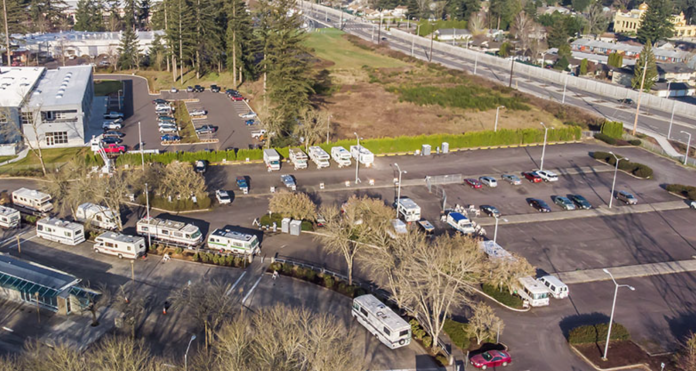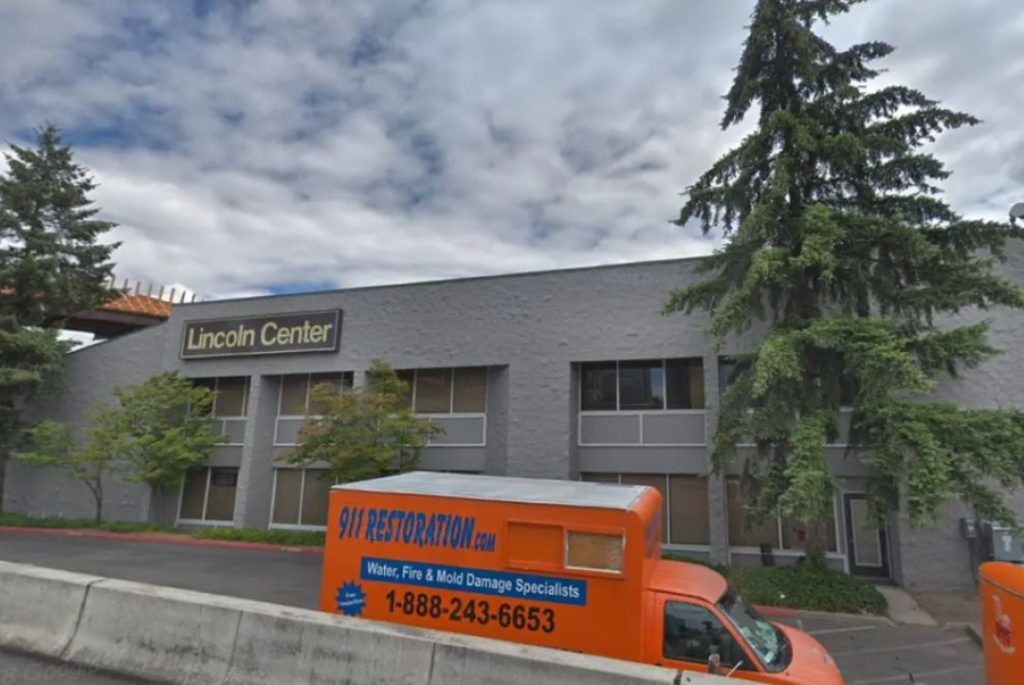
The program will use city-owned property to provide bathrooms, showers, a kitchen, and case management services for unhoused residents living in their vehicles.
It’s taken significantly longer than city leaders may have hoped for, but Bellevue has moved one step closer towards opening its first “safe parking” facility for residents experiencing homelessness this spring. At Monday’s meeting, Bellevue City Council unanimously approved a contract with human services organization 4 Tomorrow to operate the pilot program, which will provide space for up to 20 vehicles to park 24/7 through at least the end of this year.
The program will be located in a parking lot at the Lincoln Center, a city-owned building in the Wilburton neighborhood that was previously the site of the city’s only men’s homeless shelter. The former operator of the facility, Porchlight (previously Congregations for the Homeless), has since moved into a new permanent complex in the Eastgate neighborhood. Bellevue is allowing 4 Tomorrow to use some of the now-vacant building’s facilities — like bathrooms, offices, and kitchen — through a no-cost lease while the organization delivers services to vehicle residents.

Initial program details first emerged in July 2022, when City staff presented the Bellevue City Council with different organizational models through which services could be provided. Instead of establishing a program staffed and directly managed by the City, both staff and Council instead preferred to contract the program to a human services organization who would be able to deliver services while complying with city regulations and contract stipulations.
For example, 4 Tomorrow will be required to develop and have residents sign onto a code of conduct, which will include policies against the consumption of illegal drugs and alcohol. Furthermore, the organization will draft a safety plan that must be reviewed and approved by the Bellevue Police Department. 4 Tomorrow will also be required to provide staffing for the on-site day center during its hours of operation, and staff must be available 24/7 to respond to emergencies.
Given the strict sobriety policy, the program will not follow the “housing first” model that experts consider a best practice, meeting clients where they are at to stabilize their circumstances. However, given the lack of alternatives in Bellevue, the facility will be a welcome addition.
Developing and staffing a whole new program for a large city like Bellevue takes significant organizational capacity — something that many Eastside human services organizations were not able to provide, according to Nico Quijano, the city’s Homelessness Services Coordinator. During the city’s three Request for Proposals (RFPs), Quijano heard from organizations who were already overtaxed in delivering their existing services and doubted their ability to find staff to administer a new and unfamiliar program.
When City Council ultimately approved the program model and directed staff to initiate the search for a provider in January 2023, staff acknowledged the difficulties that neighboring cities had in finding capable human services organizations to administer similar programs. However, perhaps few expected a process that would result in a full year-long delay from the projected opening date of spring 2023 at a significantly greater cost.
Where staff previously budgeted $450,000 per year in the two-year operating budget for a safe parking program, 4 Tomorrow’s contract is for $672,500 through December 31, 2024. With satisfactory performance, Bellevue has the option to extend the contract to June 1, 2025 for the full $900,000 appropriation — albeit after only at most 15 months of service have been delivered to unhoused residents.
However, Quijano wasn’t optimistic that a city-staffed approach could have delivered services more quickly and at lesser cost, noting that finding staff and creating an administrative structure would still have been an intensive undertaking for the city. “By choosing to contract with [4 Tomorrow], we have the opportunity to expand the work of an already excellent local organization, and the potential to scale up in the future to more broadly address the needs of this population,” Quijano shared in a written statement.
And although it might have taken a while for her organization to get there, the possibilities created by the program interested 4 Tomorrow’s Executive Director Monik Martinez from day one. Martinez said the organization submitted an application during the city’s second RFP process, which initiated a dialogue around the community’s needs and the city’s vision.
“After much deliberation, research, and outreach conducted (with existing safe parking programs, community based organizations, schools, city staff, i2, and the community), the 4 Tomorrow team determined we were ready to expand our organization and operate this much needed program,” Martinez said.
The organization that Martinez mentions, i2 Strategies, is a consulting firm with experience in planning similar safe parking programs and collecting data to better deliver services. Staffed by Colin DeForrest and Stephanie Martinez — the former homelessness outreach coordinators of Olympia and Bellevue, respectively — the organization will help 4 Tomorrow as a subcontractor with administration and planning work.
Despite contracting the delivery of services to nonprofit organizations, residents in the program will still need to be referred and vetted by City staff to be accepted, meaning that Bellevue staff retain significant control over who will have access to the program. Since staff counts have estimated that at least 54 households in Bellevue were living in their vehicles as of summer 2023, and because the program will only serve a maximum of 20 vehicles, staff will necessarily have to prioritize who will receive services.
During a presentation to City Council last week, Quijano mentioned that first priority will be given to families with children who are living in passenger vehicles. In his written statement, Quijano further shared that City staff already have made contact with several Bellevue School District families who are interested in participating in the program. Beyond these families, staff will be vetting participants on a first-come, first-served basis and basing their acceptance on their ability to comply with site’s code of conduct policy and willingness to receive support services.
Given the significant community need and insufficient resources currently available to meet it, part of 4 Tomorrow’s work during this pilot period will be to assist with building out community capacity to provide services. As part of their contract, 4 Tomorrow have been directed to provide planning, administration, and case management services for up to four additional safe parking sites on interested religious properties.
Such support could result in an additional 20 vehicles being served, but 4 Tomorrow would first have to identify religious organizations that would be able to host safe parking services on their properties.
Without additional resources, such programs would also likely end at the contract’s expiration in June 2025. At that point, Bellevue City Council would need to choose whether to continue the pilot program by appropriating additional funding, or ending it and no longer providing services to the families that will have come to rely on them. By then, Council will have over a year’s worth of data, reports, and stories that will guide their decision in how to meet this community need.
Chris Randels is the founder and director of Complete Streets Bellevue, an advocacy organization looking to make it easier for people to get around Bellevue without a car. Chris lived in the Lake Hills neighborhood for nearly a decade and cares about reducing emissions and improving safety in the Eastside's largest city.


